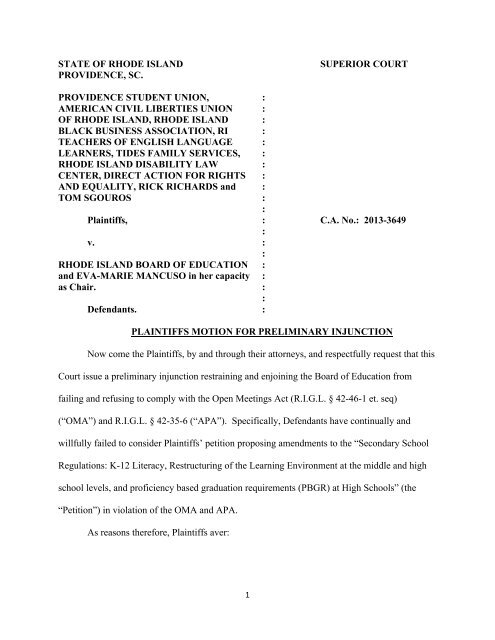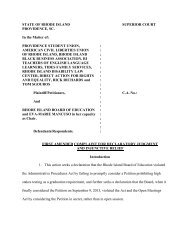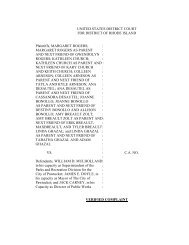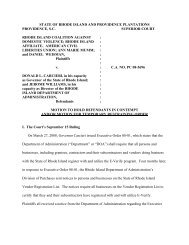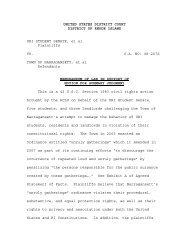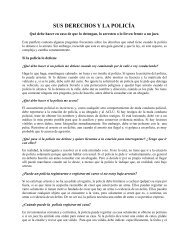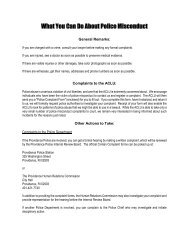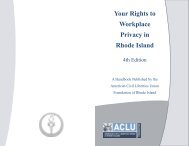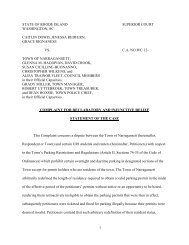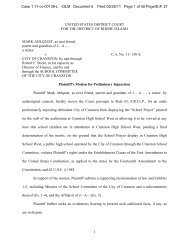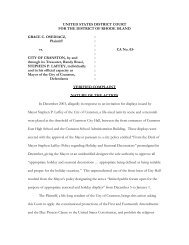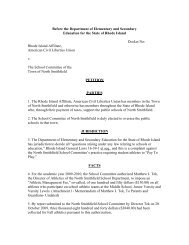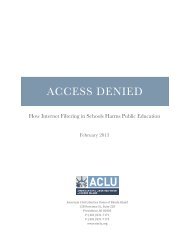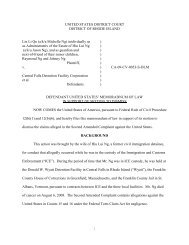Motion for Preliminary Injunction - ACLU of Rhode Island
Motion for Preliminary Injunction - ACLU of Rhode Island
Motion for Preliminary Injunction - ACLU of Rhode Island
You also want an ePaper? Increase the reach of your titles
YUMPU automatically turns print PDFs into web optimized ePapers that Google loves.
STATE OF RHODE ISLANDPROVIDENCE, SC.SUPERIOR COURTPROVIDENCE STUDENT UNION, :AMERICAN CIVIL LIBERTIES UNION :OF RHODE ISLAND, RHODE ISLAND :BLACK BUSINESS ASSOCIATION, RI :TEACHERS OF ENGLISH LANGUAGE :LEARNERS, TIDES FAMILY SERVICES, :RHODE ISLAND DISABILITY LAW :CENTER, DIRECT ACTION FOR RIGHTS :AND EQUALITY, RICK RICHARDS and :TOM SGOUROS ::Plaintiffs, : C.A. No.: 2013-3649:v. ::RHODE ISLAND BOARD OF EDUCATION :and EVA-MARIE MANCUSO in her capacity :as Chair. ::Defendants. :PLAINTIFFS MOTION FOR PRELIMINARY INJUNCTIONNow come the Plaintiffs, by and through their attorneys, and respectfully request that thisCourt issue a preliminary injunction restraining and enjoining the Board <strong>of</strong> Education fromfailing and refusing to comply with the Open Meetings Act (R.I.G.L. § 42-46-1 et. seq)(“OMA”) and R.I.G.L. § 42-35-6 (“APA”). Specifically, Defendants have continually andwillfully failed to consider Plaintiffs’ petition proposing amendments to the “Secondary SchoolRegulations: K-12 Literacy, Restructuring <strong>of</strong> the Learning Environment at the middle and highschool levels, and pr<strong>of</strong>iciency based graduation requirements (PBGR) at High Schools” (the“Petition”) in violation <strong>of</strong> the OMA and APA.As reasons there<strong>for</strong>e, Plaintiffs aver:1
Parties and Jurisdiction1. The Providence Student Union (“PSU”) is a youth-led student organizing programwith chapters at multiple Providence public high schools. A number <strong>of</strong> PSU students have beenlabeled at risk <strong>of</strong> not graduating because <strong>of</strong> the high stakes testing graduation requirement, andso are currently undergoing significant harm from the effects <strong>of</strong> curriculum narrowing, loss <strong>of</strong>electives and even core classes, and the replacement <strong>of</strong> real learning with test prep, both duringthe school year and the summer. Students believe a <strong>for</strong>mal, public hearing process is necessary.2. The American Civil Liberties Union <strong>of</strong> <strong>Rhode</strong> <strong>Island</strong> (<strong>ACLU</strong>/RI) is a nonpartisan,non-pr<strong>of</strong>it organization with over 2,000 members in <strong>Rhode</strong> <strong>Island</strong>, whose mission is topreserve and protect civil rights and liberties. Since at least 2008, <strong>ACLU</strong>/RI has raised concernswith the <strong>Rhode</strong> <strong>Island</strong> Department <strong>of</strong> Education and other policy-makers about the use <strong>of</strong> “highstakes testing” in <strong>Rhode</strong> <strong>Island</strong> and its disproportionate and adverse impact on racial minorities,English Language Learners, students with disabilities, and other vulnerable groups.3. The <strong>Rhode</strong> <strong>Island</strong> Black Business Association (“RIBBA”) is a non-pr<strong>of</strong>itorganization dedicated to enhancing the growth and economic empowerment <strong>of</strong> minority ownedbusinesses by providing them a <strong>for</strong>um to competitively participate in the local and globaleconomy, primarily through business development, legislative advocacy, business mentoring,quality educational opportunities and pr<strong>of</strong>essional development. In recognition <strong>of</strong> the clearconnection between education and business, and the questionable validity <strong>of</strong> high stakes testingas an educational tool, RIBBA has strongly supported ef<strong>for</strong>ts to rescind the state’s high stakestesting requirement.4. The <strong>Rhode</strong> <strong>Island</strong> Teachers <strong>of</strong> English Language Learners (“RI TELL”) is a nonpr<strong>of</strong>itpr<strong>of</strong>essional organization <strong>for</strong> ESL and Bilingual Education teachers in <strong>Rhode</strong> <strong>Island</strong>. As an2
affiliate <strong>of</strong> International TESOL (Teachers <strong>of</strong> English <strong>for</strong> Speakers <strong>of</strong> Other Languages), thepurpose <strong>of</strong> RI TELL is to serve <strong>Rhode</strong> <strong>Island</strong> teachers <strong>of</strong> English Language Learners and theirstudents, from Pre-K through Adult Education. Among the many reasons RI TELL opposes highstakes testing in English <strong>for</strong> English Language Learners is that testing students in a language thestate itself has verified they do not read or write pr<strong>of</strong>iciently is neither valid nor reliable.5. Tides Family Services is a not-<strong>for</strong> pr<strong>of</strong>it organization that provides a range <strong>of</strong>community-based services <strong>for</strong> the state’s most at-risk adolescents. These systems <strong>of</strong> support,which include individual and family programming conjunction with educational programmingand advocacy, are increasingly critical in today’s education and job market. Since a high schooldiploma communicates a level <strong>of</strong> independence and growth that will provide our clients with theopportunity to pursue a better job and future educational opportunities, Tides believes that todeny or substantially discourage the attainment <strong>of</strong> this basic credential is to knowingly increasechronic school absenteeism and ongoing social isolation.6. <strong>Rhode</strong> <strong>Island</strong> Disability Law Center (“RIDLC”) is the private non-pr<strong>of</strong>it law<strong>of</strong>fice that is the designated protection and advocacy agency <strong>for</strong> the State <strong>of</strong> <strong>Rhode</strong> <strong>Island</strong>. Inthis capacity, RIDLC advocates <strong>for</strong> the special education rights <strong>of</strong> students with disabilities, aswell as their ef<strong>for</strong>ts to obtain post-secondary education and/or vocational supports. RIDLCendorses those national studies and best practice models that counsel against using high-stakestests to determine graduation readiness <strong>for</strong> students with disabilities, and instead support the use<strong>of</strong> multiple indicators <strong>of</strong> student learning and skills to demonstrate graduation readiness.7. Direct Action <strong>for</strong> Rights and Equality (“DARE”) is a member led organizationwhose mission is to organize low-income families in communities <strong>of</strong> color <strong>for</strong> social, politicaland economic justice. DARE works to undo the systems <strong>of</strong> oppression that are the root cause <strong>of</strong>3
the problems facing those communities, and opposes the structural racism and furtherdisenfranchisement <strong>of</strong> communities that standardized testing requirements cause.8. Rick Richards is a member <strong>of</strong> the <strong>ACLU</strong>/RI and a retired employee <strong>of</strong> the <strong>Rhode</strong><strong>Island</strong> Department <strong>of</strong> Education’s Offices <strong>of</strong> Testing, School Improvement and SchoolTrans<strong>for</strong>mation. He has testified at a number <strong>of</strong> public hearings in opposition to the use <strong>of</strong> highstakes testing.9. Tom Sgouros is a member <strong>of</strong> the <strong>ACLU</strong>/RI, and a freelance engineer, policyanalyst, and writer. He is the parent <strong>of</strong> a high school student whose educational opportunitieshave been damaged, he believes, by the state’s high stakes testing policies. He has written anumber <strong>of</strong> articles about, and testified on, the issue <strong>of</strong> high stakes testing.10. Eva-Marie Mancuso is the Chair <strong>for</strong> the <strong>Rhode</strong> <strong>Island</strong> Board <strong>of</strong> Education.11. The <strong>Rhode</strong> <strong>Island</strong> Board <strong>of</strong> Education (“RIBOE”) is the administration agencyresponsible <strong>for</strong> promulgation <strong>of</strong> high school graduation requirements.12. Jurisdiction is vested in the Superior Court pursuant to R.I. Gen. Laws § 9-30-1et. seq.Facts13. By letter dated May 20, 2013, certain individual and organizations, includingPlaintiffs, urged the RIBOE to rescind regulations adopted by its predecessor, the Board <strong>of</strong>Regents <strong>for</strong> Elementary and Secondary Education, that condition receipt <strong>of</strong> a high schooldiploma on passing a “high stakes test,” the New England Common Assessment Program(“NECAP”). The letter noted that the newly-constituted RIBOE “has not had the opportunity toconsider the full consequences” <strong>of</strong> the NECAP requirement, and particularly in light <strong>of</strong> the“potentially devastating impact <strong>of</strong> the requirement,” asked the RIBOE to consider “alternative4
strategies to improve student outcomes.” A true and accurate copy <strong>of</strong> the May 20, 2013, letter isattached as Exhibit A. The RIBOE did not respond to the May 20, 2013, letter.14. By letter dated June 21, 2013, certain organizations, including Plaintiffs,submitted a petition pursuant to R.I.G.L. 42-35-6 and the RIBOE’s Title A Regulations, A-1-23,proposing amendments to the “Secondary School Regulations: K-12 Literacy, Restructuring <strong>of</strong>the Learning Environment at the middle and high school levels, and pr<strong>of</strong>iciency based graduationrequirements (PBGR) at High Schools” (the “Petition”).15. The Petition addressed the controversy surrounding implementation <strong>of</strong> theNECAP graduation requirement by inviting an “<strong>of</strong>ficial and structured rule-making process.” Itwould essentially prohibit high stakes testing as a graduation requirement, and instead, requirethat any such assessment “be used to promote school and district accountability andimprovement and to target early and intensive remediation to individual students and to at-risksub-groups.” However, the June 21, 2013, letter was careful to note that Petitioners “were notrequesting Board members to take a definitive stand on the merits <strong>of</strong> the Petition,” but rather toinitiate a “public rule-making process” in which there might be “timely, meaningful andstructured consideration <strong>of</strong> this critical issue.” The letter designated <strong>ACLU</strong>/RI as the contactagency <strong>for</strong> any response to the Petition. A true and accurate copy <strong>of</strong> the June 21, 2013 letter andPetition is attached as Exhibit B.16. By letter to <strong>ACLU</strong>/RI dated July 12, 2013, RIBOE Chair Mancuso responded tothe Plaintiffs’ letter and Petition by stating that RIBOE members would be receiving “an indepthin<strong>for</strong>mational briefing on the relationship between large-scale assessments and graduationrequirements” at an annual retreat on August 24 and 25, and that “the Board has taken no actionto ‘deny’ your position” but was also not “in a position to begin <strong>for</strong>mal rulemaking within the5
prescribed time period [specified in 42-35-6].” The letter concluded by stating that it should beconsidered “equivalent to a ‘denial’ <strong>of</strong> your petition . . . born <strong>of</strong> temporal circumstance only.” Atrue and accurate copy <strong>of</strong> the July 12, 2013 letter is attached as Exhibit C. The RIBOE did notdiscuss or consider Plaintiffs’ Petition, nor did the RIBOE discuss or vote upon either denyingthe Petition or initiating rule-making proceedings pursuant to 42-35-6.17. A regularly scheduled meeting <strong>of</strong> the RIBOE was held on July 15, 2013, withinthirty (30) days <strong>of</strong> Plaintiffs’ Petition to RIBOE. The Agenda <strong>for</strong> the July 15, 2013, meeting didnot include a discussion or consideration <strong>of</strong> Plaintiffs’ Petition. A true and accurate copy <strong>of</strong> theposted agenda <strong>for</strong> the July 15, 2013 RIBOE meeting is attached as Exhibit D. The RIBOE didnot discuss or vote upon either denying the Plaintiffs’ Petition or initiating rule-makingproceedings pursuant to 42-35-6 at this meeting.18. On or about August 2, 2013, Plaintiff Richards, along with two others, filed suitagainst Defendants regarding their stated intent to conduct the August 24-25 “retreat,” referencedin the July 12, 2013 letter, in closed session. On or about August 6, 2013, Justice Procacciniissued an injunction enjoining Defendants from holding a discussion <strong>of</strong> the graduationrequirements in closed session. See Exhibit E. As a result, the retreat was opened to the public.Although the NECAP graduation requirement was discussed, no action was taken with regard tothe Petition.19. On or about August 14, 2013, the RIBOE met in closed, executive session todiscuss the instant lawsuit as filed on July 24, 2013. Immediately following that executivesession, Defendant Mancuso announced that the RIBOE would be considering the Petition at itsSeptember 9, 2013 meeting.6
20. On or about September 6, 2013, the RIBOE posted the Agenda <strong>for</strong> its September9, 2013 meeting. The Agenda provided, in pertinent part:9. EXECUTIVE SESSIONThe Board may seek to enter into Executive Session to discuss -‐-‐a. Update on Collective Bargaining pursuant to RIGL §42-‐46-‐5 (a)(2)(all bargaining units except Graduate Assistants)b. Discussion <strong>of</strong> Litigation – Prov. Student Union et al. v. Board <strong>of</strong> Ed. et al.pursuant to RIGL §42-‐46-‐5(a)(2)10. ADDITIONAL ACTION ITEMSa. Board Determination on Petition <strong>of</strong> Prov. Student Union et al.29. A true and accurate copy <strong>of</strong> the Notice is attached as Exhibit F.30. On September 9, 2013, a number <strong>of</strong> the Plaintiffs, including PSU, <strong>ACLU</strong>/RI,RITELL, RIDLC, and Richards; other signatories to the Petition; and members <strong>of</strong> the public whohad been apprised <strong>of</strong> the meeting by the Plaintiffs, attended RIBOE’s scheduled meeting in orderto listen to and watch the discussion and deliberations <strong>of</strong> the members <strong>of</strong> the RIBOE inconsidering the Petition. At that meeting, the RIBOE went into closed, executive session todiscuss the instant lawsuit. In addition to discussing the litigation, the RIBOE discussed andconsidered the “Determination on Petition <strong>of</strong> Prov. Student Union et al.” in closed, executivesession. Immediately following the closed, executive session, Defendant Mancuso announcedthat the RIBOE had discussed and considered the Petition and had voted to deny the Petition by avote <strong>of</strong> 6-5. The RIBOE engaged in no public discussion <strong>of</strong> the Petition prior or subsequent toannouncing the vote on it, and did not explain the reason <strong>for</strong> the denial.36. On September 19, 2013, Defendant Mancuso stated, in a Providence Journal Op-Ed,that the September 9 vote “was not about the merits <strong>of</strong> any <strong>of</strong> our battery <strong>of</strong> state assessments; it7
was about starting the debate again about whether or not to have state assessments.” Thus, byDefendant Mancuso’s admission, the vote concerned a matter <strong>of</strong> public policy.Standard For Issuance Of <strong>Preliminary</strong> Injunctive ReliefPursuant to R.I. Gen. Laws § 42-46-8(d), “this court may issue injunctive relief anddeclare null and void any actions <strong>of</strong> a public body found to be in violation <strong>of</strong> this chapter.”Accordingly, Plaintiffs need not satisfy the traditional criteria <strong>for</strong> injunctive relief in order toobtain an injunction, here; they only need to prove a violation <strong>of</strong> the Open Meetings Act (“Act”).As discussed below, it is clear that, despite having had notice <strong>for</strong> months now that they haveviolated the Act, Plaintiffs have failed and refused to cease their violation by considering andvoting on Plaintiffs’ Petition in an open meeting. Defendants have further violated the Act byfailing to deny the petition in writing or state the basis <strong>for</strong> the denial. Consequently, Plaintiffsare entitled to an order from this Court declaring Defendants’ vote null and void and enjoiningDefendants from continuing to violate the Act.Plaintiffs are also entitled to an injunction because they satisfy the traditional criteria <strong>for</strong>injunctive relief, which are (1) a likelihood <strong>of</strong> success on the merits, (2) the possibility <strong>of</strong>irreparable harm to plaintiffs if preliminary relief is not granted, and (3) that the balance <strong>of</strong> theequities, including the public interest, as between the parties, favors plaintiffs. See The Fund <strong>for</strong>Community Progress v. United Way <strong>of</strong> Southeastern New England, 695 A.2d 517, 521 (R.I.1997). See also In re State Employees’ Union, 587 A.2d 919 (R.I. 1991); Paramount OfficeSupply Co. v. D.A. MacIsaac, Inc., 524 A.2d 1099 (R.I. 1987), Frenchtown Five, LLC v.Vanikiotis, 863 A.2d 1279, 1282 (R.I. 2004).8
ArgumentI. RIBOE VIOLATED THE APA BY FAILING TO CONSIDER THE PETITIONWITHIN THIRTY (30) DAYS, FAILING TO LAWFULLY DENY THEPETITION, AND FAILING TO STATE ITS REASONS FOR THE DENIAL.A. The RIBOE failed to consider the Petition within thirty (30) days.<strong>Rhode</strong> <strong>Island</strong> Gen. Laws § 42-35-6 provides:Any interested person may petition an agency requesting the promulgation,amendment, or repeal <strong>of</strong> any rule. Each agency shall prescribe by rule the <strong>for</strong>m<strong>for</strong> petitions and the procedure <strong>for</strong> their submission, consideration, anddisposition. Upon submission <strong>of</strong> a petition, the agency within thirty (30) daysshall either deny the petition in writing (stating its reasons <strong>for</strong> the denials) orinitiate rule-making proceedings in accordance with § 42-35-3.Emphasis added.The evidence is indisputable that RIBOE failed to comply with the thirty (30) day timeconstraint. The Petition was filed by letter dated June 21, 2013. 1 The Petition was denied 2 onSeptember 9, 2013. 3 41Although a regularly scheduled meeting <strong>of</strong> the RIBOE was held on July 15, 2013, withinthirty (30) days <strong>of</strong> filing the Petition, the Agenda <strong>for</strong> the meeting did not include a discussion orconsideration <strong>of</strong> Plaintiffs’ Petition, and RIBOE did not discuss or vote to either deny thePetition or initiate rule-making.2As discussed infra, the denial was unlawful because the determination was made inclosed session. 3Defendant Mancuso’s communication to Plaintiff <strong>ACLU</strong> did not constitute action on thePetition. Although Defendant Mancuso on July 12 advised that RIBOE members would bereceiving “an in-depth in<strong>for</strong>mational briefing on the relationship between large-scale assessmentsand graduation requirements” at an annual retreat on August 24 and 25, she added that “theBoard has taken no action to ‘deny’ your position” but was also not “in a position to begin<strong>for</strong>mal rulemaking within the prescribed time period [specified in 42-35-6].” Thus, by its terms,the letter was neither a “denial” nor initiation <strong>of</strong> rulemaking. While the letter concluded that itshould be considered “equivalent to a ‘denial’ <strong>of</strong> your petition . . . born <strong>of</strong> temporal circumstanceonly,” Section 42-35-6 prescribes that “the agency,” not its Chair, must act on the Petition.RIBOE did not discuss or consider in any manner Plaintiffs’ Petition, nor did RIBOE discuss orvote upon either denying the Petition or initiating rule-making proceedings pursuant to 42-35-6,within thirty (30) days, as required by the APA.9
B. The RIBOE failed to deny the Petition “in writing” or “stat[e] its reasons <strong>for</strong>the denial[].”<strong>Rhode</strong> <strong>Island</strong> Gen. Laws § 42-35-6 provides that “[u]pon submission <strong>of</strong> a petition, theagency . . . shall either deny the petition in writing (stating its reasons <strong>for</strong> the denials) orinitiate rule-making proceedings in accordance with § 42-35-3.” Emphasis added. Havingdenied the Petition on September 9 (in closed session), the RIBOE was in any event required todo so “in writing[,] stating its reasons.” It did neither.II.THE RIBOE VIOLATED THE OPEN MEETINGS ACT BY FAILING TOCONSIDER THE PETITION IN OPEN SESSION.The purpose <strong>of</strong> the OMA is to require that public business be conducted in the open, toallow meaningful public participation, and the provisions <strong>of</strong> the Act are to be broadly construedto effectuate this purpose. When construing a statute, the Court’s “ultimate goal is to give effectto the purpose <strong>of</strong> the act as intended by the Legislature.” Oliveira v. Lombardi, 794 A.2d 453,457 (R.I.2002) (quoting Webster v. Perrotta, 774 A.2d 68, 75 (R.I.2001)). Tanner v. TownCouncil <strong>of</strong> Town <strong>of</strong> E. Greenwich, 880 A.2d 784, 791-92 (R.I. 2005). The fundamental purpose<strong>of</strong> the OMA is set <strong>for</strong>th in the Preamble to the Act:It is essential to the maintenance <strong>of</strong> a democratic society that public business beper<strong>for</strong>med in an open and public manner and that the citizens be advised <strong>of</strong>and aware <strong>of</strong> the per<strong>for</strong>mance <strong>of</strong> public <strong>of</strong>ficials and the deliberations anddecisions that go into the making <strong>of</strong> public policy.Emphasis added. <strong>Rhode</strong> <strong>Island</strong> Open Meetings Act, R.I. Gen. Laws § 42-46-1. See also Ohs v.N. Kingstown Sch. Comm., C.A. WC 05-441, 2005 WL 2033074 (R.I. Super. Aug. 10, 2005).The General Assembly enacted the Open Meetings Act <strong>for</strong> the stated purpose <strong>of</strong>guaranteeing that public business be per<strong>for</strong>med in an open and public manner andthat the citizens be advised <strong>of</strong> and aware <strong>of</strong> the per<strong>for</strong>mance <strong>of</strong> public <strong>of</strong>ficials4The RIBOE squandered opportunities to consider the Petition at a meeting; first onAugust 14, 2013, and again, on August 24-25, when it held a “retreat” concerning graduationrequirements.10
and the deliberations and decisions that go into the making <strong>of</strong> public policy.Section 42-46-1. We have previously expressly stated that the provisions <strong>of</strong>the Open Meetings Act should be broadly construed and interpreted in thelight most favorable to public access to achieve their remedial and protectivepurpose. Solas v. Emergency Hiring Council <strong>of</strong> <strong>Rhode</strong> <strong>Island</strong>, 774 A.2d 820,824 (R.I.2001).Emphasis added. See also Anolik v. Zoning Bd. <strong>of</strong> Review <strong>of</strong> City <strong>of</strong> Newport, 64 A.3d 1171,1174 (R.I. 2013).A. The RIBOE Unlawfully Considered the Petition in Closed Session.When the RIBOE finally considered the Petition on September 9, 2013 – eighty (80) daysafter the Petition was submitted – it did so in closed, executive session. Yet the Agenda <strong>for</strong> theSeptember 9, 2013, meeting, posted on September 6, provided <strong>for</strong> determination <strong>of</strong> the Petitionin open session and “discussion” <strong>of</strong> this litigation in closed session. The Agenda provided, inpertinent part:Emphasis added.9. EXECUTIVE SESSIONThe Board may seek to enter into Executive Session to discuss -‐-‐a. Update on Collective Bargaining pursuant to RIGL §42-‐46-‐5 (a)(2)(all bargaining units except Graduate Assistants)b. Discussion <strong>of</strong> Litigation – Prov. Student Union et al. v. Board <strong>of</strong> Ed. et al.pursuant to RIGL §42-‐46-‐5(a)(2)10. ADDITIONAL ACTION ITEMSa. Board Determination on Petition <strong>of</strong> Prov. Student Union et al.R.I. Gen. Laws § 42-46-6 provides that:(a) All public bodies shall give written notice <strong>of</strong> their regularly scheduledmeetings at the beginning <strong>of</strong> each calendar year. …(b) Public bodies shall give supplemental written public notice <strong>of</strong> any meetingwithin a minimum <strong>of</strong> <strong>for</strong>ty-eight (48) hours be<strong>for</strong>e the date. This notice shallinclude the date the notice was posted, the date, time and place <strong>of</strong> the meeting,and a statement specifying the nature <strong>of</strong> the business to be discussed.11
Emphasis added. The Agenda is there<strong>for</strong>e legally inadequate <strong>for</strong> at least three reasons. First, theRIBOE promised a determination <strong>of</strong> the Petition in open session (as was legally required), yet itmade the determination in closed session. Second, the Agenda stated that only a discussion <strong>of</strong>litigation would occur in closed session, but that is where the determination <strong>of</strong> the Petitionoccurred. Third, determination <strong>of</strong> the Petition was listed as an “additional action item[],”falsely indicating that determination <strong>of</strong> the Petition was in addition to what had been discussedin closed session. Even Defendants must acknowledge the dichotomy between “discussion <strong>of</strong>litigation” and “determination” <strong>of</strong> the Petition, and the difference between “Executive Session”and “additional action items” in open session.The Supreme Court’s decision in Tanner v. Town Council <strong>of</strong> Town <strong>of</strong> E. Greenwich, 880A.2d 784, 797-98 (R.I. 2005) is directly on point. There, the Town Council posted a notice thatit would “interview” candidates <strong>for</strong> appointment to certain committees, but at the meeting insteadappointed the candidates. The Court held that the Notice was fatally defective.[W]e recognize that the OMA does not explicitly require a public body to identifyon the notice that it intends to vote on an issue at the meeting; however, our taskis to determine whether the notice provided by the town council fairly in<strong>for</strong>medthe public, under the totality <strong>of</strong> the circumstances, <strong>of</strong> the nature <strong>of</strong> the business tobe conducted. In addition to satisfying the date and time requirements <strong>of</strong> § 42–46–6(b), the contents <strong>of</strong> the notice reasonably must describe the purpose <strong>of</strong> themeeting or the action proposed to be taken. Here, plaintiff contends that the noticewas misleading, and that misleading notice does not comply with therequirements <strong>of</strong> the OMA. We agree. Clearly, fair notice to the public under thecircumstances, or such notice based on the totality <strong>of</strong> the circumstances as wouldfairly in<strong>for</strong>m the public <strong>of</strong> the nature <strong>of</strong> the business to be discussed or actedupon, is not met by misleading in<strong>for</strong>mation about the actions to be taken at ameeting <strong>of</strong> a public body. . . In our opinion, listing the agenda <strong>of</strong> the meeting asconsisting <strong>of</strong> “interviews” <strong>for</strong> potential appointments fairly implies just that, viz.,that the town council only would be conducting interviews that evening. It doesnot reasonably describe the purpose <strong>of</strong> the meeting or the action proposed to betaken as including “voting” on the appointments <strong>of</strong> these potential boardmembers. In common parlance, “interview” implies a <strong>for</strong>mal meeting in whichthe interviewer elicits in<strong>for</strong>mation from the interviewee to aid in evaluating theinterviewee. 17 Hence, by posting the agenda as consisting <strong>of</strong> interviews, the town12
failed to provide notice to the public that would reasonably describe the actionthat the town council ultimately took.Tanner, 880 A.2d at 797-98.In this case, the RIBOE’s Notice was just as misleading. It promised a determination inopen session, but made the determination in closed session. RIBOE promised only a discussion<strong>of</strong> litigation in closed session, but instead made the determination <strong>of</strong> the Petition there.This misleading conduct had real, tangible effects on the public, many <strong>of</strong> whom attendedthe meeting to hear and attempt to persuade these <strong>of</strong>ficials. They were instead presented with afait accompli when the RIBOE emerged from closed session. What message does this send toparents, educators, and particularly students, about civic participation? And about attending thenext RIBOE meeting?B. Determination Of The Petition Does Not Fall Within The “Litigation”ExceptionConsideration <strong>of</strong> the Petition does not fall within the “litigation” exemption <strong>of</strong> G.L. 42-46-5(a)(2). That section provides that a public body may close “[s]essions pertaining tocollective bargaining or litigation, or work sessions pertaining to collective bargaining orlitigation.” The Supreme Court has not had occasion to consider the scope <strong>of</strong> this exemption, butin Phoenix-Times Pub.Co. v. Barrington School Committee, 2010 WL 4688074 (RI Super.),Judge Stern issued an instructive opinion examining the issue.In Phoenix-Times, the School Committee considered in open session the merits <strong>of</strong>implementing a breathalyzer policy, then closed to the public its discussion <strong>of</strong> possible legalclaims associated with such a policy, following receipt <strong>of</strong> a letter from the <strong>ACLU</strong>. The Courtexamined whether the letter could be discussed in closed sessioin. Judge Stern began hisanalysis by noting the evident purpose <strong>of</strong> the OMA, citing Tanner and Solas:13
It is essential to the maintenance <strong>of</strong> a democratic society that public business beper<strong>for</strong>med in an open and public manner and that the citizens be advised <strong>of</strong> andaware <strong>of</strong> the per<strong>for</strong>mance <strong>of</strong> public <strong>of</strong>ficials and the deliberations and decisionsthat go into the making <strong>of</strong> public policy. Such is the declared purpose <strong>for</strong> whichthe OMA was crafted to achieve. Accordingly, the <strong>Rhode</strong> <strong>Island</strong> Supreme Courthas required that the OMA be broadly construed and interpreted in the light mostfavorable to public access in order to effectuate this significant remedial andprotective purpose.Emphasis added. Op. at 3. “[T]he articulated policy <strong>of</strong> the OMA ‘itself betokens thattwo salient First Amendment values – the public’s right to know and the accountability <strong>of</strong>public institutions – are at the core <strong>of</strong> the Act.’” (citation omitted). Op. at 5. Noting thatthe exemption was ambiguous as to “threatened” or “anticipated” litigation, Judge Stern’sanalysis returned to the statutory purpose favoring public access and governmentaccountability. It was the counterbalance <strong>of</strong> the attorney-client privilege, and thenecessary protection <strong>of</strong> trial strategy and settlement proposals, that tipped the scale. Only“litigation strategy” could be conducted in closed session.Judge Stern was careful to define the limits <strong>of</strong> this result. “Naturally, this does notmean that consultations by a public body with an attorney in private may be used as adevice to thwart the liberal implementation <strong>of</strong> the policy that the decision making processis to be open and that confidentiality is to be strictly limited.” Op. at 12. He noted withapproval the Attorney General’s view that “because virtually any action or decision by apublic body or <strong>of</strong>ficial could result in litigation, the OMA cannot be read so broadly as topermit closed session discussions any time a public [body] asserts that litigation mightensue.” Op. at 6.A similar situation obtained in Dias v. Edwards, NC900038, 1990 WL 10000173 (R.I.Super. Mar. 26, 1990). There, Justice Israel was presented with a Complaint to enjoin a school14
committee from negotiating without first noticing the meeting under the OMA. Distinguishingthe “collective bargaining and litigation” exception, he noted:Section 42-46-5(a)(2) refers to the situation where the school committee meets,apart from the bargaining process itself, to consult among its members or with itsnegotiating team to discuss and/or act on matters pertaining to collectivebargaining. It ought not refer to the occasions when the committee or one <strong>of</strong> itssubdivisions meets as part <strong>of</strong> an on-going bargaining process.Emphasis in original. Thus, the Court distinguished between the confidential component,insulated by 42-46-5(a)(2), and the actual process <strong>of</strong> bargaining, which the Court held was noteven a “meeting” under the Act. And as Justice Savage held in a similar context, the mereexistence <strong>of</strong> litigation does not convert an otherwise public matter into a litigation matter.Pine v. Charlestown Town Council, et al, C.A.No. 95-491, 1997 WL 839926 (R.I. Super. June 4,1997). See also Burnett v. Gloucester Cnty. Bd. <strong>of</strong> Chosen Freeholders, 409 N.J. Super. 219,236-37, 976 A.2d 444, 455 (App. Div. 2009) (“the subject under discussion must be the pendingor anticipated litigation itself, i.e., the public body must be discussing its strategy in thelitigation, the position it will take, the strengths and weaknesses <strong>of</strong> that position with respect tothe litigation, possible settlements <strong>of</strong> the litigation or some other facet <strong>of</strong> the litigation itself.”).Thus, the litigation exemption is to be narrowly construed to protect litigationstrategy. It is not a talisman <strong>for</strong> government secrecy. And the mere existence <strong>of</strong>litigation, or the threat <strong>of</strong> litigation, does not render public policy discussionsconfidential.As <strong>of</strong> September 9, the litigation involved the (undisputed) allegation that defendantsfailed to act on the Petition within thirty (30) days, and sought a Writ <strong>of</strong> Mandamus directingDefendants to act. That question is obviously distinct from the merits <strong>of</strong> the Petition, i.e.,reconsidering utilization <strong>of</strong> NECAP testing as a graduation requirement. Indeed, Defendant15
Mancuso admitted as much in a Providence Journal Op-Ed, when she stated that the September 9vote “was not about the merits <strong>of</strong> any <strong>of</strong> our battery <strong>of</strong> state assessments; it was aboutstarting the debate again about whether or not to have state assessments.” Having concededthat the vote was about the merits <strong>of</strong> the Petition, rather than “litigation strategy,” it is clear thatthe exemption does not apply.It is important at this juncture to note that the merits <strong>of</strong> the Petition involve a critical issuein public education. The Petition proposed amendments to the “Secondary School Regulations:K-12 Literacy, Restructuring <strong>of</strong> the Learning Environment at the middle and high school levels,and pr<strong>of</strong>iciency based graduation requirements (PBGR) at High Schools.” It addressed thecontroversy surrounding implementation <strong>of</strong> the NECAP graduation requirement. This is a matter<strong>of</strong> keen public interest, and has engendered charged debate. Clearly the matter deserved publicairing, and the public was disserved by the secret session.Of course, there is no small irony in Defendants’ invocation <strong>of</strong> the litigation exceptionafter violating the thirty day time constraint. Consideration <strong>of</strong> the Petition would have occurredin open session had it been considered by the RIBOE in a timely fashion. Having failed to actwithin thirty (30) days, thereby provoking a lawsuit, Defendants now claim consideration <strong>of</strong> thePetition can occur in secret. Defendant asks this Court to condone, indeed reward, its initialviolation <strong>of</strong> the APA by giving it a free pass under the OMA. This turns both statutes, intendedto promote open and responsible government, upside down. The Supreme Court “will notconstrue a statute to reach an absurd result.” Kaya v. Partington, 681 A. 2d 256, 261 (R.I. 1996).16
III.AS A REMEDY, THE COURT SHOULD DECLARE THE SEPTEMBER 9 VOTENULL AND VOID, AND ISSUE A PRELIMINARY INJUNCTION DIRECTINGTHE RIBOE TO CONSIDER THE PETITION.As noted above, on August 6, 2013, the Court issued an order requiring the Board <strong>of</strong>Education to “open to the public” discussions regarding “the NECAP and high-stakes testing thatthey are considering implementing her in <strong>Rhode</strong> <strong>Island</strong> or have implemented here in <strong>Rhode</strong><strong>Island</strong>.” See Exhibit E at p. 4. If the Board failed to “open that [subject] to the public, then theCourt … order[ed] that that topic not be discussed at the retreat so it’s either open to the publicor eliminated from the agenda.” Id. The basis <strong>for</strong> the Court’s order was that the OMA permittedinjunctive relief under R.I.G.L. § 42-46-8(d) and that Plaintiffs made a strong showing that thesubject matter that would be discussed regarding NECAP and graduation requirement “must bean open public meeting and not be in a closed meeting pursuant to the Open Meetings Act.”Exhibit E at p. 2. Notably, the Court also found that Plaintiffs satisfied the other requirements<strong>for</strong> injunctive relief. “Our legislature has enacted a specific act which protects the rights <strong>of</strong> thepublic to know what goes on in the meetings <strong>of</strong> public bodies so I think the order … will servethe public interests.” Exhibit E at p. 3. Finally, the Court noted that Plaintiffs provedirreparable harm because they are being deprived “<strong>of</strong> that right which our legislature hasdeclared is <strong>of</strong> utmost importance so, clearly, substantial, irreparable harm would result if they’redeprived <strong>of</strong> their right to participate in that meeting.” Id.In direct violation <strong>of</strong> the Court’s Order, or at least in circumvention <strong>of</strong> the intent<strong>of</strong> the Order, the Board considered and voted on the matter in closed session. For thesame reasons that Plaintiffs were entitled to an order requiring the Board to hear thematter in open session last month, Plaintiffs are presently entitled to an order requiringthe Board to consider and vote on their petition in open session as soon as possible.17
The very word 'secrecy' is repugnant in a free and open society; and we are as apeople inherently and historically opposed to secret societies, to secret oaths, andto secret proceedings.John F. Kennedy, April 27, 1961, “The President and the Press” speech to the AmericanNewspaper Ass’n, New York.The RIBOE has had ample opportunity to post an accurate Agenda and complywith the thirty (30) day time constraint; its time in fact expired over two (2) months ago.This time can never be recaptured, and each day is another violation <strong>of</strong> the APA andOMA; the damage is, in a word, irreparable. The only meaningful remedy <strong>for</strong> thisviolation is an order directing the RIBOE to consider the Petition immediately, at aspecial meeting with that matter alone on the Agenda.The RIBOE has proven itself unable or unwilling to consider the Petition inaccordance with the OMA. Whether to commence rulemaking or deny the Petition is amatter <strong>of</strong> public policy, and the RIBOE Chair has conceded as much. There<strong>for</strong>e, theCourt should further order that the Petition be considered on its merits by initiating apublic rulemaking process, or in the alternative, be considered in open session.The Court should further declare the vote unlawfully taken in closed session null andvoid, and should order payment <strong>of</strong> a fine and attorneys’ fees pursuant to G.L. 42-46-8(d), whichprovides:The court shall award reasonable attorney fees and costs to a prevailingplaintiff, other than the attorney general, except where specialcircumstances would render such an award unjust.The court may issue injunctive relief and declare null and void any actions<strong>of</strong> a public body found to be in violation <strong>of</strong> this chapter. In addition,the court may impose a civil fine not exceeding five thousand ($5,000)dollars against a public body or any <strong>of</strong> its members found to havecommitted a willful or knowing violation <strong>of</strong> this chapter.18
In this regard, the Court should note that the RIBOE has been deliberate in its disregard<strong>of</strong> the APA and OMA. Plaintiffs reminded Defendants <strong>of</strong> the thirty (30) day requirementwell in advance <strong>of</strong> its expiration, yet Defendant Mancuso took it upon herself to issue aletter “equivalent to a denial,” rather than present the matter to the full Board in a timelyfashion. The RIBOE might easily have posted and considered the Petition on July 15 orat the August 24-25 retreat, but failed to do so. In addition, only a month be<strong>for</strong>e holdingthe unlawful closed session, Defendants were subject to a Court Order on this very sameeducational issue, as noted above. And <strong>of</strong> course, when the matter was finally presentedto the RIBOE, it was considered in secret.Finally, the Court should note that, notwithstanding Defendant Mancuso’spronouncements, the issue raised by the Petition is a matter <strong>of</strong> great public concern. Theissue divides, and likely will continue to divide, well-meaning observers on both sides <strong>of</strong>the question, including the RIBOE, which decided the question in secret by a single vote.It is simply not adequate <strong>for</strong> the RIBOE to claim it considered the matter in 2010 andnow it’s closed. Students, businesspeople, teachers, advocates and community membersfiled a Petition asking this Board to do what educators ought to do –continually examine,question, reconsider, and if necessary revise education policy to ensure best outcomes <strong>for</strong><strong>Rhode</strong> <strong>Island</strong> students. Just as importantly, this is what both the APA and the OMArequire the Board to do, and precisely what they have failed to do.19
Plaintiffs/Petitioners,By their attorneys,________________________Marc Gursky, Esq. (#2818)Elizabeth Wiens, Esq. (#6827)GURSKY LAW ASSOCIATES<strong>ACLU</strong> <strong>of</strong> RI Cooperating Attorneys420 Scrabbletown Rd., Ste. CNorth Kingstown, R.I. 02852Tel. (401) 294-4700Fax. (401) 294-4702mgursky@rilaborlaw.comewiens@rilaborlaw.comCERTIFICATIONA true and accurate copy <strong>of</strong> the <strong>for</strong>egoing was served upon Paul Sullivan, Esq., onSeptember ______, 2013.__________________________20


